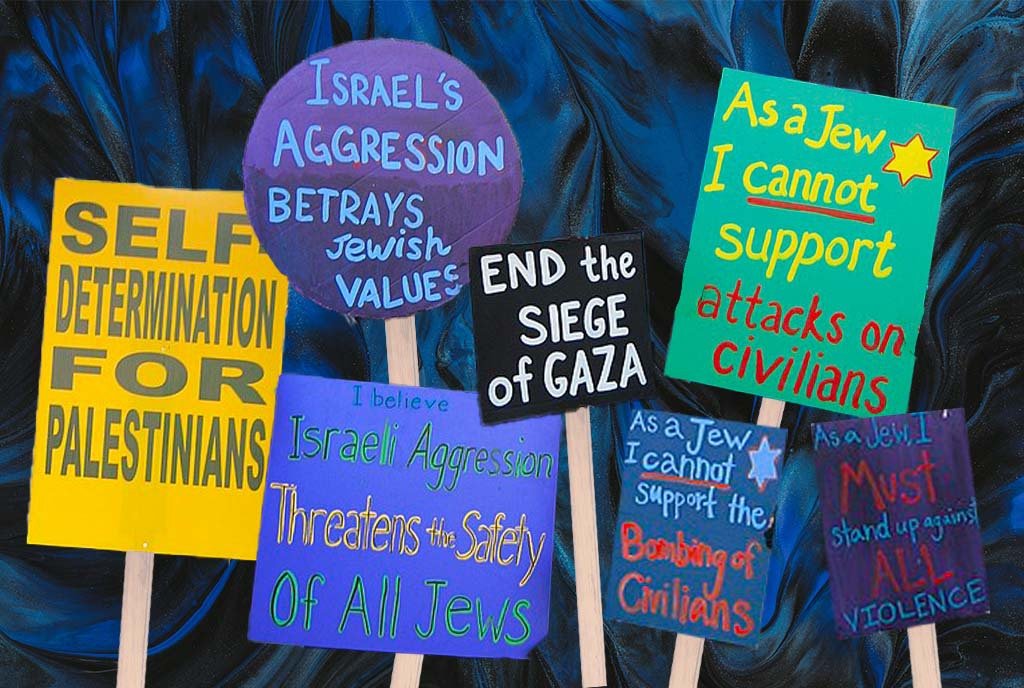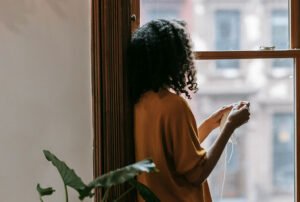
In the wake of the October 7 attack by Hamas on more than 1,000 Israelis, mostly civilians—and the subsequent military response by Israel, including the bombardment and reoccupation of Gaza, which has resulted in over 11,000 Palestinian deaths—we have seen a swelling of support for both “sides” of the conflict. But support for each side in the United States has taken different forms.
Israel and its policies have been widely embraced, with notable exceptions, by US elected officials and much of the US political establishment. Opposition to Israel’s response, by contrast, has manifested largely in grassroots movements and organizations through protests, demonstrations, and acts of civil disobedience.
“JVP represents a voice that is not often heard in US politics and mainstream media.”
One such organization is Jewish Voice for Peace (JVP)—a US nonprofit based in Berkeley, CA, with chapters across the country—which has called for a ceasefire since Israel’s response to the October 7 attacks. The organization has also staged or helped organize dozens of demonstrations across the country, calling on elected officials to stand against US military support for Israel and its policies regarding Palestinians.
JVP represents a voice that is not often heard in US politics and mainstream media: self-identified Jews who oppose the ongoing actions by the Israeli state in Gaza and the concept of Israel as a Zionist state—at least as they define the term—representing a supremacist ideology.
The nonprofit and its actions are often viewed as controversial. The US-based Anti-Defamation League (ADL) calls JVP “a radical anti-Israel and anti-Zionist activist group that advocates for the boycott of Israel and the eradication of Zionism.” The ADL also claims that JVP “does not represent the mainstream Jewish community, which it views as bigoted for its association with Israel.”
Meanwhile, JVP, which is openly “anti-Zionist,” is defiantly centered around its Jewish identity, characterizing its activism as rooted in Jewish values and beliefs around justice.
NPQ got the chance to talk with JVP Senior Communications Manager Sonya Meyerson-Knox. In this interview, Meyerson-Knox expands on the group’s political, philosophical, and spiritual stance regarding the ongoing conflict in the Middle East.
NPQ: What is Jewish Voice for Peace?
Sonya Meyerson-Knox: Jewish Voice for Peace is a national, grassroots, progressive, anti-Zionist organization that has been around for over 25 years. We have over 70 chapters across the country….We have a rabbinical council made up of rabbis that numbers well over 50. We have a Health Advisory Council and Academic Advisory Council, and we have always worked on educating, advocating, and trying to shift US governmental policy towards a just peace for Palestinians and Israelis. And so, the goal is not just a future that looks a lot like what we’ve seen in the past, but instead a future where everybody lives in safety, everybody lives in equality, everybody is free, it is properly democratic, and everybody has equal say in how their lives are being run. We’ve been doing that work for a number of years, and right now, that work is feeling more urgent than ever.
“When supremacy is enacted, we see apartheid.”NPQ: Some would characterize an “anti-Zionist” stance as being anti-Semitic. What does it mean to JVP, as a Jewish organization, to be “anti-Zionist”?
SMK: Zionism is a political ideology that, in its current incarnation—as espoused by the Israeli government, of which many, many members of the current Israeli government openly advocate for this—is a form of supremacy. In this case, it happens to be Jewish supremacy. But it is supremacy.
And so that’s why the Israeli government about four years ago passed the “nation-state law,” which gives people who are Jewish more rights than people who are not Jewish and privileges the Hebrew language over Arabic or English, even though 20 percent of all Israeli citizens are not Jewish. And when supremacy is enacted, we see apartheid, which is what every single international [organization]—the United Nations, Amnesty International, Human Rights Watch, Palestinian rights organizations—have been saying.
So, to be anti-Zionist as Jew is to say that our Judaism predates Zionism by thousands of years. Our Judaism is not tied up with the interests of the Israeli government. Our Judaism is all about tikkun olam, [the Jewish concept of] repairing the world, building a space of justice, equality, safety, and freedom for all.
NPQ: What is the message you are trying to get out there? What can JVP add to the conversation?
SMK: So, public discourse has been overwhelmingly focused on the miscomprehension, or the faulty belief, that Jews are a monolithic people and diaspora Jews, Jews in the United States, all think and feel one thing, and that one thing is tied up with whatever the Israeli government is thinking and feeling. In fact, we would argue that there have always been Jews inside of Israel, and there still are, as well as outside, of which there are tens and tens of thousands that are highly critical of what the Israeli government is doing.
And right now, when the Israeli military is bombing a besieged, captive population that has nowhere to flee, it is more important than ever that we speak up and remind people that, in fact, this is not what American Jews want. What American Jews want is a future where people live together in safety and equality and freedom. We want a future of justice.
Sign up for our free newsletters
Subscribe to NPQ's newsletters to have our top stories delivered directly to your inbox.
By signing up, you agree to our privacy policy and terms of use, and to receive messages from NPQ and our partners.
But what is being done right now is being done allegedly in our name. And we say, “Never again.” We do not want to see genocide or war waged on anyone, and you will not do it in our names. But it has to go one step further because we’re not just Jews anywhere, we’re Jews in the United States—and the United States, already before the current war, sent $3.8 billion in military funding to the Israeli government. Now that package has, of course, increased enormously. If our tax dollars are being used by our government that we elect to inflict these horrors, then our government is complicit, and [to that] we say not in our name, not with our tax dollars.
Our job is to remind people that there are other options here, that what we need is a ceasefire. And then we need a process that allows actual negotiations in order to have a future where people have justice and equality and safety and freedom.
NPQ: This must put tremendous pressure on an organization like Jewish Voice for Peace. How are you organizing and mobilizing in this moment?
SMK: We are using every single tool in our toolbox and then some….[F]or our online supporters, people who can’t necessarily make it to all the demonstrations, we have held daily online gatherings. We call them power hours, and we’ve been bringing sometimes as many as 3,000 people together into a Zoom meeting where they get an update from the ground. We link them to digital action: call or email your representative to urge them to support the Ceasefire Now Resolution that is in the House. Or call and email your senator to make them start one. Write a letter to the New York Times or to your local newspaper pointing out all the things I just said or connect with these protests that are being organized either by Jewish Voice for Peace or by our allies.
“We are trying to shift US policy towards one of justice for Palestinians and Israelis.”
We’ve also been organizing protests. We partnered with another Jewish organization called If Not Now, and they organized the [October] protest that was held outside of the White House, where about 50 people were arrested [for] civil disobedience and blocking entrances to the White House. And then [two days later] we led about 5,000 people on the National Mall in a rally where Representatives Rashida Tlaib and Cori Bush spoke. And then that demonstration turned into a march that marched up to Congress. Meanwhile, we had 500 people enter the Cannon House Office Building, where we did a giant act of civil disobedience….They prayed and sang and chanted and demanded a ceasefire. And over 350 [people], led by 25 rabbis…were arrested. So, we are doing what we can to get our narrative into the mainstream media and heard by the people in power who can actually stop the carnage.
NPQ: On the one hand, JVP is a voice that does not get heard much in the United States, at least not in mainstream media; on the other, JVP is accused by some of being anti-Jewish. What is it like to occupy that space, not just as activists but as a group that claims a strong Jewish identity?
SMK: We are trying to shift US policy, and US policy exists for lots and lots of reasons. Very rarely does it exist purely based on what is good for human beings and value centering human rights. There [are] lots of interests that impact humane policy, whether it’s weapons manufacturers or other business interests.
We are trying to shift US policy towards one of justice for Palestinians and Israelis. In doing so, we are coming up against people who are very comfortable with US policy as it is. And so, what it feels like all too often is that my organization and the tens of thousands of American Jews who are disturbed, worried, concerned by the actions of the Israeli government—we are pushed outside of popular understanding. We are told that we are not welcome in synagogues. We are fired from jobs; we are fired from jobs teaching Jewish day schools. We are told by family members that we can’t come to Passover and to the Seder table unless we’re not political. We are attacked on social media. Our students are facing doxxing campaigns—there are people, adults, who receive salaries to attack 18-year-olds online and ruin their potential for a career.…It is heartbreaking.
And I’m speaking about what American Jews face. If you’re Palestinian, and you’re trying to advocate for your rights and for the world to acknowledge that you’re a person, that you have the right to tell your story, that you’re going to be critical of the Israeli government, you’re going to hold it to account for the human rights violations that it’s committed when it stole your family home or imprisoned your 12-year-old cousin—then you’re told you can’t speak at all.
The level of backlash and censorship is enormous. And yet we persist because this is how justice is won, right? Whatever we are facing is minuscule compared to what Palestinians are facing—certainly the Palestinians in Gaza—right now.
But more importantly, we will not have our religion turned into the tool of other governments. Our religion predates all of this by thousands of years and has always centered social justice. And we are going to continue working on that and being a loud voice that I believe helps open up doors.
We can stand up and say, “You’re doing this in our name.” And we say, “No, not in our name.”
And quite frankly, we can also point [out] what is actually being said by the Israeli government right now. It’s not just that they are bombing a captive population. It’s that they are publicly committing an intent to continue doing so. They are publicly calling for genocide. The minister of defense is threatening to flatten the entirety of Gaza because these are “human animals” that live there. And as Jews, we know our history, right? We know what happens when you get demonized, when you’re otherized, when you’re called an animal. We know what happens next. That’s why we’re standing up. And it’s so important that we stand up and remind the rest of our community and the rest of Americans that when we say never again, it means for anyone, and it means for Palestinians.
There’s no military solution to what’s happening right now.…We need a ceasefire, we need a political solution grounded in justice.













